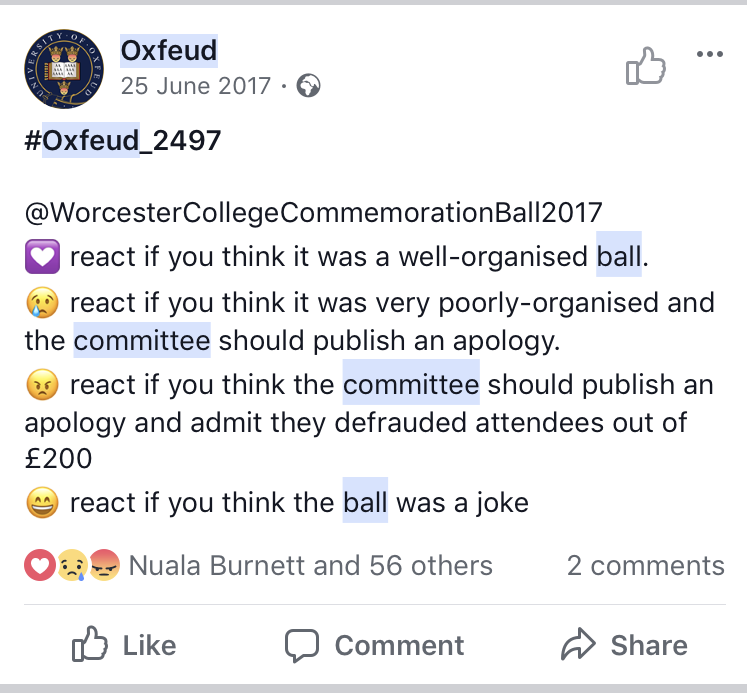One question that I have had to continuously grapple with during my tenure as Theatre Editor for Cherwell is “to what extent should criticism of the original text – over which a cast and crew have little real control – feature in a review?” So frequently have I left the theatre for a friend to say something to the effect of “good acting: shame about the script”, that I feel that the subject deserves greater consideration. As reviewers, is it our duty to stray towards criticising the source-text, the framework of the production? What, or who, is culpable for an outdated script dragging down an otherwise technically competent production?
Before we get properly dramatical, it is necessary to establish the concept of subjectivity. Everyone’s tastes are different. Some people will respond better to comedy than to tragedy, to musical theatre than to physical theatre – so there is no objectively ‘right’ way to review a play. Beyond that, each individual showing of a production is different (I refer to the beautiful opportunities for gaffs, cock-ups, corpsing, set malfunctions, and bad sound mixing: enough to make my reviewer-self swoon). As reviewers, we must also come to terms with the inevitability that we will not catch everything. This is perhaps especially pertinent in Oxford, where productions so often pose so many intellectually striking questions that the critic may be left feeling overwhelmed. Though we may feel like we have grasped the ineffable ‘point’ of a play, it is something else entirely to condense that into a set number of words. Critics, like actors, are only human.
Accepting subjectivity is important because the issue of whether to criticise a source-text or not essentially comes down to a personal, stylistic choice based on one’s experience with a play. Although I had been considering this topic for a long time prior to this, it was when I was writing my review of Rose and Fox Productions’ The History Boys that I could skirt around this issue no longer. The acting, on the whole, was solid; the staging, while simple, was effective at evoking that school-time nostalgia; yet I left the theatre feeling like I had not really enjoyed it as much as I should have, and, in the process of writing my review, I would have to itemise why. My revelation: that most of my gripes were with Alan Bennett himself, not with this cast and crew.
There! Have I not just admitted that this style of reviewing is too detached from what is actually up there on the stage? It is a bit more complicated than that. When the reviewer’s experience of a play is so bound up in its script, that alone justifies its inclusion in a review, regardless of who is responsible for it. When El Port writes in her Sweet Charity review that during “the number ‘Big Spender’ [she] felt very uncomfortable because it was like we were invited to objectify the actresses, and it didn’t feel ironic, or tongue in cheek”, she refers to euphemism and sexualisation explicit in the source-text. Its interpretation on the stage, though true to the script, directly affected El’s enjoyment of the show. When Alice Taylor says in her review of Revolt. She Said. Revolt Again, “Any criticism I could give of this play lies entirely in the text. Revolt has a constraining pace, logic, and at times slightly baffling moments”, she separates her criticism of the production from Alice Birch’s text, yet she nevertheless admits that it affected her experience of this specific play. Notice the reviewers’ uses of verbs like “feel” and the first-person “I”/“we”: the writers acknowledge their subjectivity because they realise that they are reviewing experiences, not merely plays. They are acutely aware of their duty to record their own response as it befell them on that night.
The question we are left with, then, is how does this work with the play formally? The ‘play’ is a unique medium in which text and physical movement combine; neither of these can exist in isolation and still be called a ‘play’. Nowadays, you can quite easily access, read, and study a script without seeing it performed. Likewise, you can enjoy a play that does not have a ‘script’ in the traditional sense of the word: improvised and devised theatre spring to mind. It just so happens that, with the way that theatre has evolved, we have come to treat the script and performance as separate entities. It is only when text is given context that we attach the term ‘play’: the performance of a script.
This leads to the idea of modification. Luckily for all creative minds out there, the theatrical text need not be a prescriptive form. Playwrights might include extensive glosses and stage directions to indicate their intentions, but the director can ultimately choose to ignore all of that. We acknowledge that Lucy Kirkwood’s Hedda exists in and of itself, because that is what we see performed: the trace of Ibsen’s original remains but is heavily modified. In my view, however, every performance of a play that has a physical script modifies ‘the original’ in some way, where ‘original’ can mean the very first performance of a play, or what critics may have deemed the most quintessential or contextually ‘faithful’ portrayal of that play. The act of performing a script is inevitably one of reinterpretation, a modification, because the Globe Theatre has turned you down and Laurence Olivier could not make it: the original conditions in which a play was performed can never be exactly replicated. Every director, every crew member, every actor, every movement, every line delivered, every subsequent night, has the potential to affect the character of a performance and contributes to the limitless number of ways a play can be performed. It is modifications like these, some deliberate, some noticeably spontaneous, perhaps unintentional additions on the night – an uneasy glance, a concerned tone, detached body language – that can make a text like Sweet Charity “ironic or tongue in cheek”. Directors and producers exhaustively emphasise the nuance of their vision because they are conscious of the way every element of a play interrelates to produce the drama the audience witnesses. Surely then, the duty of the critic is to comment on any of these elements, including the text, that they feel have a substantial impact on the production, in addition to all the things the director cannot foresee on the night and which become part of the viewer’s experience.
This may sound like a bunch of abstract, theoretical gobbledygook, and that is because it is. However, it is also an attempt to order my thought processes when reviewing such works. Perhaps an applied anecdote will help. Getting back to The History Boys, I recognised firstly that I did not enjoy the play even though others around me had (subjective experience). Then, in planning my review, I realised that the majority of my problems were explicit in the source-text: not the production company’s responsibility (source-text and performance as separate entities). I then realised that that did not matter a jot, because the script had affected my experience and the performance would not have existed without it (text and context). I then recognised that, if a group of people shows enough admiration of a writer’s work to perform it, they have also demonstrated an appreciation that makes them capable of engaging with, and interpreting, the script (potential for modification). What I witnessed on the night was a production using its Oxford context to make the play seem more relevant, but not using it to engage with the more outdated elements of the text, even though I know that the content of The History Boys would have resonated with at least a few of the cast members (subjectivity fused with modification). Therefore, I believe that criticising the source-text of play in a specific performance’s review is justifiable, if it impacts the viewer’s experience.
So, have I discovered some totalising solution, some golden template against which to police reviewing styles? Absolutely not. The beauty of criticism is much like the beauty of theatre: each performance is different. At the end of the day, it is your call what you want to highlight in your review, because your viewing experience is your own. For me, that has to be one of the most rewarding aspects of reviewing for Cherwell: being able to relate my opinions on a medium I love, while also having the potential to entertain and spark debate. If there is one thing I would like anyone to take away from this, it is the idea of theatre reviewing as experiential criticism of an artform that is especially context-sensitive. I only hope that the discussion resulting from this theorising, just as Izzy Troth said of the stage adaptation of The Kite Runner, has “a choreographed exuberance [my] prose cannot achieve”.





